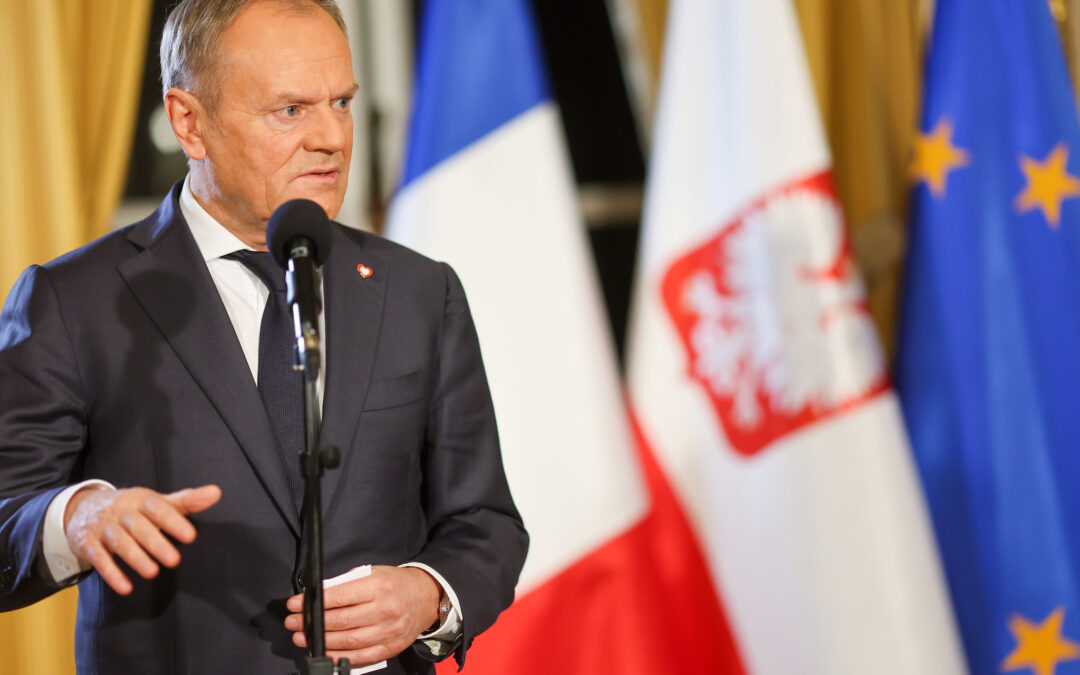Keep our news free from ads and paywalls by making a donation to support our work!

Notes from Poland is run by a small editorial team and is published by an independent, non-profit foundation that is funded through donations from our readers. We cannot do what we do without your support.
Polish Prime Minister Donald Tusk has criticised the prospect of European exclusion from peace talks over Ukraine, insisting that the continent must be central in shaping its security.
“There should be no decisions on Ukraine without Ukraine and no decisions – in terms of Europe’s security – without Europe,” he said today after a meeting in Paris with European and NATO leaders.
Tusk added that there was “consensus and unanimity” among participants on the need for greater defence investment and said that European nations should not be frustrated by US pressure to spend more.
💬 Premier @DonaldTusk w #Paryż:
Od wszystkich uczestników spotkania usłyszałem, że w interesie całej Europy jest jak najpilniejsze i intensywne działanie na rzecz wzmocnienia współpracy sojuszników.— Kancelaria Premiera (@PremierRP) February 17, 2025
The Monday summit, convened by French President Emmanuel Macron, brought together leaders from the United Kingdom, Germany, Italy, Spain and Denmark, alongside NATO Secretary-General Mark Rutte, European Commission President Ursula von der Leyen and European Council President Antonio Costa.
The discussions focused on transatlantic relations and Europe’s role in the Ukraine conflict. Tusk explained that the participants broadly shared Poland’s stance on “key issues” but cautioned that the meeting was only “a prelude to what will happen in the coming weeks and months”.
The Polish prime minister said that the European leaders remain committed to ensuring Ukraine has a say in any future peace process, adding that any subsequent security arrangements should not exclude Europe.
He said there was strong support for close cooperation between Europe and the United States on security guarantees for Ukraine, emphasising that “there can be no divergence here”.
Tusk appeared to make his comments in response to statements made by General Keith Kellogg, the US lead envoy on Ukraine, who said over the weekend that European nations would be excluded from negotiations aimed at ending Russia’s war.
Speaking at the Munich Security Conference, Kellogg confirmed that while Ukraine would “of course” be involved in peace talks, European governments would not automatically have a seat at the table, reported Reuters.
“If it is possible to provide guarantees for Ukraine, also through a joint presence with the United States, with the NATO countries, then of course Poland will be active in this process in various ways,” said Tusk.
He clarified, however, that he does not foresee sending Polish peacekeeping troops to Ukraine. Leaders from Germany, Italy and Spain also expressed scepticism at the idea of deploying their own troops, while British Prime Minister Keir Starmer said that he is “prepared to consider committing British forces on the ground”.
Donald Trump’s new defence secretary, @PeteHegseth, has hailed Poland as a “model ally” during a visit to Warsaw on his first overseas trip.
He said that US relations with Poland are "unmatched" anywhere else in Europe and he "came here to reinforce that" https://t.co/em9cZYn2JW
— Notes from Poland 🇵🇱 (@notesfrompoland) February 14, 2025
Tusk warned that if the countries bordering Russia and Belarus – including Poland – are not secure and lack full support from NATO and the European Union, they will be unable to effectively assist Ukraine.
The Polish leader emphasised that it is “absolutely necessary” for Europe to bolster its defence through increased spending. Poland is NATO’s top relative spender on defence, with Warsaw expected to allocate 4.7% of its GDP to military expenditure this year, the highest share in the alliance.
“The EU, and allies like the UK and Norway, will be able to stabilise the situation and support Ukraine in maintaining its sovereignty only if Europe can effectively defend itself against threats,” said Tusk. “This is not the case at the moment.”
The Polish prime minister, however, welcomed assurances from the European Commission that significant financial resources would be available for defence. He said billions of euros could be mobilised immediately without the need for new debt securities.
Donald Trump’s call with Vladimir Putin was a “mistake”, says Poland's foreign minister.@sikorskiradek also warned Trump that failing to ensure a fair peace for Ukraine would undermine US credibility and embolden China in its ambitions to take Taiwan https://t.co/UQ1cyiMav5
— Notes from Poland 🇵🇱 (@notesfrompoland) February 15, 2025
Tusk also said that he had received assurances that defence spending would no longer be included in calculating the European Union’s excessive deficit procedure, under which Poland was placed last year for exceeding the public finance sector deficit limit of 3%.
“This is an important change,” he said, calling it a “serious concession to logic” after months of lobbying from Poland in Brussels.
Due to high defence spending, Poland expects to have a deficit of 7.3% of its GDP this year.
If we, Europeans, fail to spend big on defence now, we will be forced to spend 10 times more if we don’t prevent a wider war. As the Polish PM I’m entitled to say it loud and clear, since Poland already spends almost 5% of its GDP on defence. And we will continue to do so.
— Donald Tusk (@donaldtusk) February 17, 2025

Notes from Poland is run by a small editorial team and published by an independent, non-profit foundation that is funded through donations from our readers. We cannot do what we do without your support.
Main image credit: Kancelaria Premiera / flickr.com (under CC BY-NC-ND 2.0)

Alicja Ptak is deputy editor-in-chief of Notes from Poland and a multimedia journalist. She has written for Clean Energy Wire and The Times, and she hosts her own podcast, The Warsaw Wire, on Poland’s economy and energy sector. She previously worked for Reuters.



















